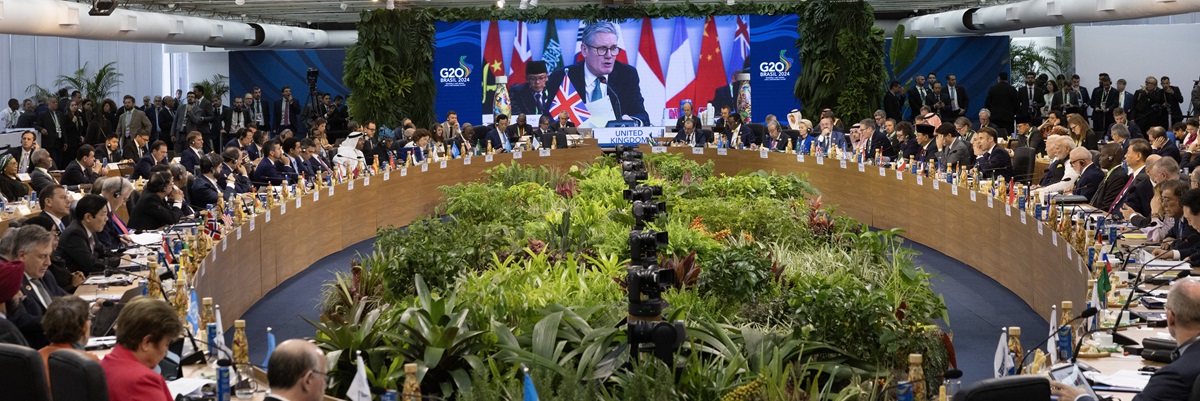Diplomacy
A review of the G20: more of the same or significant progress?

Image Source : Wikimedia Commons
Subscribe to our weekly newsletters for free
If you want to subscribe to World & New World Newsletter, please enter
your e-mail
Diplomacy

Image Source : Wikimedia Commons
First Published in: Nov.20,2024
Dec.02, 2024
The outcome of the G20 leaders' summit held in Rio de Janeiro undoubtedly marks a series of victories for Brazilian foreign policy and also for the international community if we understand what is considered a success in terms of global governance.
Firstly, the G20 summit declaration is a major achievement for Brazilian diplomacy, as it brings together twenty countries around agendas that not all of them support (such as human rights). Reaching this consensus required a year of intense negotiations to reach the final result.
Brazil obtained support on the main themes it proposed: hunger and poverty, always off the radar of rich countries; sustainability; the bioeconomy , reaching the first multilateral treaty on the subject.
Another consensus was the taxation of the super-rich , an issue that touches on the issues of inequality between countries and tax havens. Reaching the support of the G20 members around these proposals represented the reconstruction of the objectives of Brazilian foreign policy, which had been mocked during the Bolsonaro government, and crowned Brazil's return as a relevant country in the international community after years of self-inflicted isolation.
Two other points that went unnoticed by some analyses is that the G20 summit allowed dialogue with Venezuela to return to normal, avoiding enormous damage to the Brazilian government and preserving good relations with the tumultuous neighboring country.
And what can we say about the turbulent presence of the newest representative of the Latin American extreme right, Argentine President Javier Milei, who until the last moment tried to undo the consensus reached and was skillfully circumvented by Brazilian diplomacy?
Returning to the proposals made by the presidency and supported by the other members of the group, are they “more of the same”, “undefined”, that do not change at the international level, as some analysts and part of the press said yesterday? Understanding the nature of international forums such as the G20 may answer this question.
Outlined in 1999 and formalized in 2008, the G20 was created to bring together finance ministers and central bank governors from the twenty largest economies on the planet to discuss the financial crises of those periods. The crises of the 1990s, in particular, brought a new factor: it was the first time that economic problems in developing countries affected the central economies. It was therefore necessary to expand the discussions beyond the restricted Group of Seven (G7), a group of rich countries created in 1975, and to bring emerging economies to the negotiating table. Over the years, the G20 began to discuss other topics besides finance, and today sustainability is at the center of the work.
The G20 emerged as an informal group with a flexible structure, dependent on a rotating presidency among its members to organize summits and working groups. In addition, it does not have a constitutive treaty and does not have the capacity to impose standards.
When reading this brief description, most people wonder why a forum of this kind should exist if it “serves no purpose.” But informality and flexibility are a demand of the member countries that voluntarily chose to participate. These are the characteristics that allow ministers and other representatives of countries with divergent interests, such as the United States and Russia, to discuss issues that affect humanity, such as the eradication of hunger or climate change, for almost a year. The concrete actions that we so desperately need will depend on the efforts of each country and the corresponding pressure from their civil societies. The commitments exist, and now it is necessary to demand their implementation.
Imagining a world without any kind of coordination is difficult because we have lived under the weak governance of the United Nations (UN) since the end of the Second World War, which, by the way, will be 80 years old in 2025. The memories of an international system under constant threat of global wars and in which common problems were not even discussed are a pale memory and, perhaps for this reason, so many people disdain the advances of international forums such as the G20.
There are political forces today that oppose these alliances and the minimum level of global governance that we have managed to achieve, as Milei’s criticisms in his speech at the leaders’ meeting made clear. In line with the thinking of other far-right politicians, the Argentine president called global governance a “corset” that suffocates countries that think differently. It is contradictory that international regimes are criticized for restricting the freedom of States while at the same time being accused of being weak and ineffective, which demonstrates empty criticisms that serve only to encourage their supporters against imaginary enemies.
Leaders like Donald Trump and Miley defend the “every man for himself” rule in international relations. This idea is gaining more and more followers among the people, a situation that makes declarations like the one by the G20, which defends basic principles of human rights and sustainability, an important manifesto for those who still defend an international order based on rules and cooperation. The Brazilian presidency has achieved important achievements for our foreign policy and also for the international order that it seeks to preserve.
First published in :

PhD from the Institute of International Relations of the University of São Paulo (IRI-USP) and coordinator of the Postgraduate Program in Politics and International Relations, Foundation School of Sociology and Politics of São Paulo (FESPSP)
Unlock articles by signing up or logging in.
Become a member for unrestricted reading!